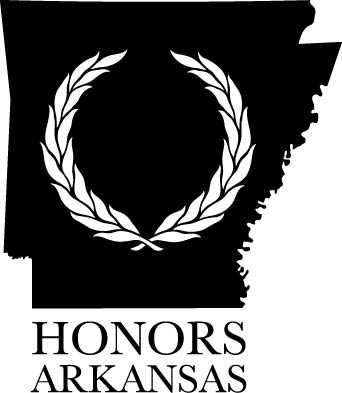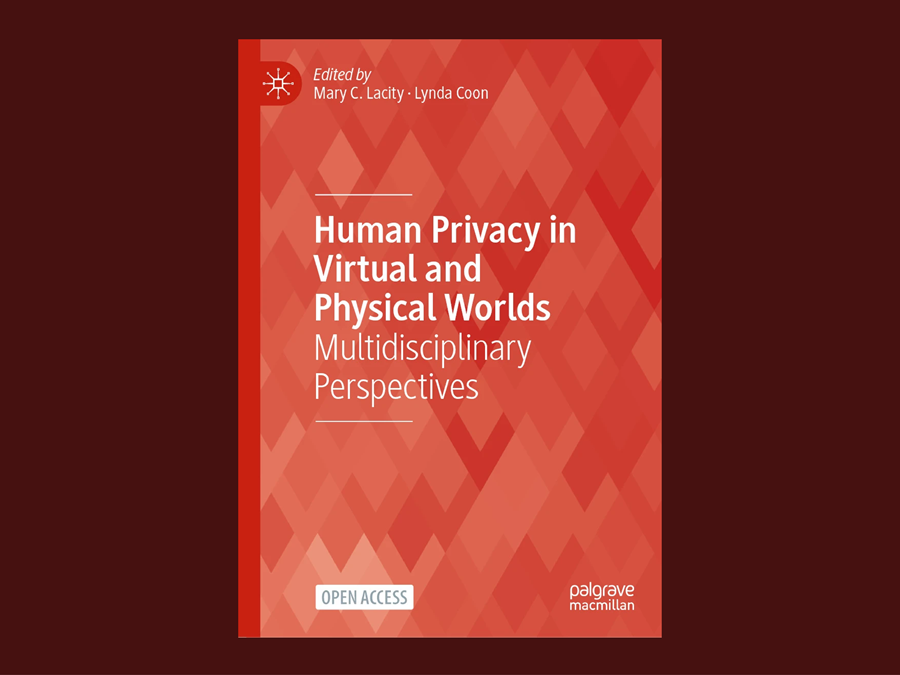Surveillance cameras poised at truck drivers, facial recognition software at the airport, digital wallets, spoofing attacks, smart contracts, skylights in pediatric clinics, traditional knowledge and naked bike rides — privacy as a concept is a moving target across the globe that has been morphing and transforming historically over time.
Inspired by an honors intersession course on privacy, a group of Honors Arkansas faculty collaborated on writing an open-access book, Human Privacy in Virtual and Physical Worlds (Palgrave Macmillan, 2024). By moving beyond the limitations of a single disciplinary lens, the book aims at a richer, comprehensive and lasting analysis of human privacy from 10 different disciplines.
"The statewide Honors Arkansas Forum taught virtually in May 2023 enrolled students from both two-year and four-year institutions of higher education, along with five students from Amsterdam,” Honors College Dean Lynda Coon noted. “Together, they mined multiple disciplines from the humanities, social sciences, fine arts and STEM to discern historical patterns in the long narrative of human privacy concerns as well as technological innovations and the anxieties that spring up from them. A terrific group of scholars and students collaborated to create this pioneering, open-access text.”
 The publication is edited by Mary C. Lacity, the David D. Glass Chair and Distinguished Professor of Information Systems in the Sam M. Walton College of Business, and Coon, who is also a professor of history. The book is part of the Technology, Work, and Globalization Series edited by Lacity and Leslie P. Willcocks, emeritus professor at the London School of Economics and Political Science.
The publication is edited by Mary C. Lacity, the David D. Glass Chair and Distinguished Professor of Information Systems in the Sam M. Walton College of Business, and Coon, who is also a professor of history. The book is part of the Technology, Work, and Globalization Series edited by Lacity and Leslie P. Willcocks, emeritus professor at the London School of Economics and Political Science.
“I was one of the guest lecturers in the Summer 2023 Honors Privacy Forum. I attended all the sessions along with students because I was so excited by the lineup of speakers from other disciplines,” Lacity shared. “As an information systems scholar, I primarily study information privacy, but I was awed by views on privacy from other disciplines like philosophy, anthropology and architecture. Dean Coon and I decided that this content needed to be shared more widely, so the idea for the book was born.”
Through an interdisciplinary investigation into privacy, the book confronts readers with both familiar and novel readings of privacy to understand the tension between the best interests, rights and preferences of the individual compared to those of the group.
The book nods to the subject’s complexity by approaching privacy from different fields of thought and centering competency around five definitions. Readers will also explore the growing uncertainty between physical and virtual worlds, distinctions between public and private, descriptive and prescriptive approaches to privacy, the intrinsic versus instrumental value of privacy and the tensions between privacy and security.
“Addressing privacy in the modern context is what is often termed a ‘wicked problem,'” according to an introduction by Lacity and Coon. “Coined by Rittel and Weber in 1973, this concept refers to a problem that is socially complex, involving multiple stakeholders with differing perceptions, preferences and levels of power.”
While the book examines privacy’s relationship to the physical world, like the role of windows in architecture or the Western notions of privacy challenged in World Naked Bike Day, privacy’s “interplay between the virtual and physical realms” is weighed heavily.
Readers learn about information privacy and the growing need to safeguard personally identifiable information as human connection deepens online. Christopher Farnell, assistant professor of electrical engineering and computer science at the U of A, illustrates how privacy and cybersecurity are inextricably linked and the vulnerabilities that exist on the Internet when predefined boundaries, like international borders, do not exist.
The book also aims to expand scholars’ understanding of privacy by introducing perspectives on human privacy from humanistic, social scientific, design and STEM disciplines.
In addition to Lacity and Coon, contributors to the book include:
- David Barrett, teaching assistant professor of philosophy, U of A
- Marlon Blackwell, E. Fay Jones Chair and Distinguished Professor of architecture, U of A
- Erran Carmel, professor of information technology, American University
- Daniel Conway, teaching professor of information systems and associate director of the Blockchain Center of Excellence, U of A
- William Cox, assistant professor of computer science, University of Arkansas at Little Rock
- Christopher Farnell, assistant professor of electrical engineering and computer science, U of A
- Brian S. Fugate, chair of the Department of Supply Chain Management and the Oren Harris Endowed Chair in Transportation, U of A
- Kiran K. Garimella, assistant professor of information systems and management, University of South Florida
- Simon Hawkins, director of the Donaghey Scholars Honors Program and associate professor of anthropology, University of Arkansas at Little Rock
- D. Micah Hester, chair and professor in the Department of Medical Humanities and Bioethics, University of Arkansas for Medical Sciences
- Philip Huff, assistant professor of computer science and director of cybersecurity research at the Emerging Analytics Center, University of Arkansas at Little Rock
- Sharon Mason, associate professor of philosophy and religious studies, University of Central Arkansas
- Karl D. Schubert, professor of practice and associate director for the Data Science Program, U of A
- Marc A. Scott, assistant professor of practice of supply chain, U of A
- Matthew Waller, dean emeritus of the Sam M. Walton College of Business and professor of supply chain management, U of A
- Katerina Windon, Collections Management and Processing Unit head, Special Collections Division in the University of Arkansas Libraries
- Joshua Youngblood, Instruction and Outreach Unit head, Special Collections Division in the University of Arkansas Libraries
"Working with such an exceptional team to coauthor a book on privacy has been immensely rewarding,” Farnell shared, noting how privacy is a subject that is highly nuanced and better viewed through the lenses of different disciplines.
With funding from the Honors College and the David D. Glass Chair, the publication is licensed under the Creative Commons Attribution 4.0 International License and permits use, sharing, adaptation, distribution and reproduction. The book can be accessed here.
“It is exciting that a timely and collaborative work such as this book on privacy is being published Open Access,” Jason Battles, dean of libraries, said. “Open Access publications ensure that significant research and information produced by outstanding scholars is available to everyone across the globe. This means that more people will have the opportunity to engage with this text and use its information for the greatest benefit while elevating the work done at the University of Arkansas."
About Honors Arkansas: Honors Arkansas is an alliance of honors colleges and programs from across the state collectively working to enhance the scholarly, professional and social experiences of high-achieving students. Each May Intersession, Honors Arkansas partners honors scholars with faculty from multiple institutions with the goal of diving into pressing subjects of great interest to the current generation of students.
About the Honors College: The University of Arkansas Honors College was established in 2002 and brings together high-achieving undergraduate students and the university’s top professors to share transformative learning experiences. Each year the Honors College awards up to 90 freshman fellowships that provide $80,000 over four years, and more than $1 million in undergraduate research and study abroad grants. The Honors College is nationally recognized for the high caliber of students it admits and graduates. Honors students enjoy small, in-depth classes, and programs are offered in all disciplines, tailored to students’ academic interests, with interdisciplinary collaborations encouraged. All Honors College graduates have engaged in mentored research.
About the University of Arkansas: As Arkansas' flagship institution, the U of A provides an internationally competitive education in more than 200 academic programs. Founded in 1871, the U of A contributes more than $2.2 billion to Arkansas’ economy through the teaching of new knowledge and skills, entrepreneurship and job development, discovery through research and creative activity while also providing training for professional disciplines. The Carnegie Foundation classifies the U of A among the few U.S. colleges and universities with the highest level of research activity. U.S. News & World Report ranks the U of A among the top public universities in the nation. See how the U of A works to build a better world at Arkansas Research and Economic Development News.
Topics
- Architecture
- Business & Finance
- Research & Innovation
- Humanities
- Social Sciences
- Fay Jones School of Architecture and Design
- College of Education and Health Professions
- College of Engineering
- Fulbright College of Arts & Sciences
- School of Law
- Sam M. Walton College of Business
- Honors College
- University Libraries
- Division of Research & Innovation
- Department of Anthropology
- Department of History
- Department of Information Systems
- Department of Philosophy
- J.B. Hunt Transport Department of Supply Chain Management
- Department of Architecture
- Data Science Program
- Division of Special Collections
- Blockchain Center of Excellence
- Computer Engineering Program
- Computer Science Program
Contacts
Mary Lacity, Distinguished Professor of Information Systems
Sam M. Walton College of Business
479-575-6114,
Lynda Coon, dean
Honors College
479-575-7678,
Shelby Gill, director of communications
Honors College
479-575-2024,
